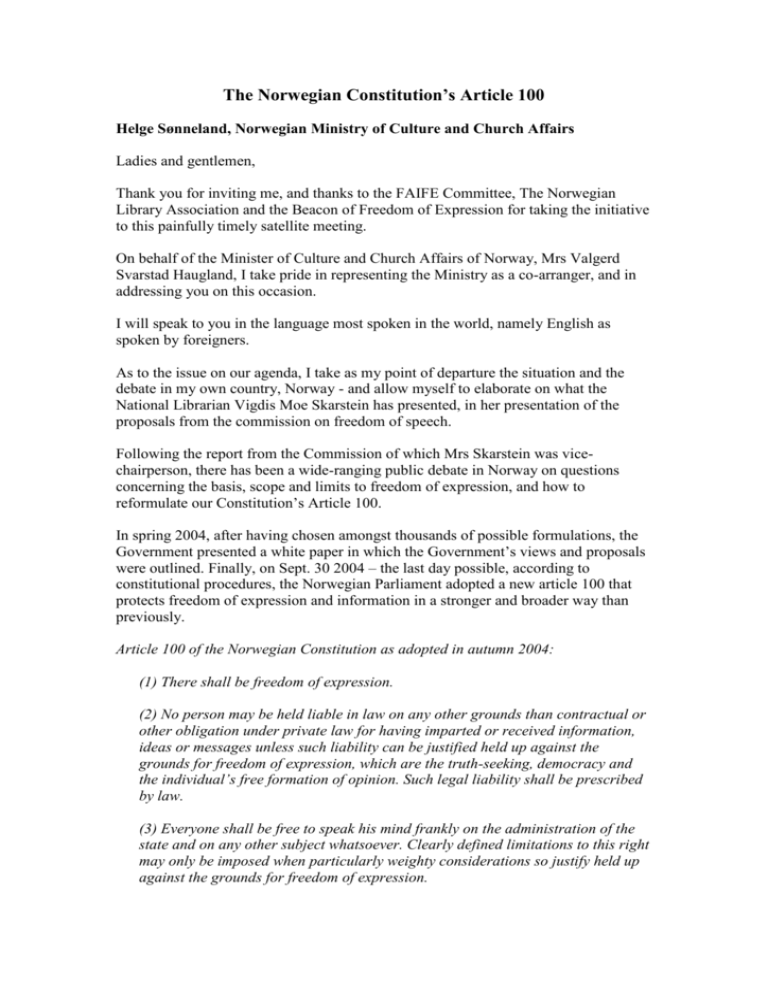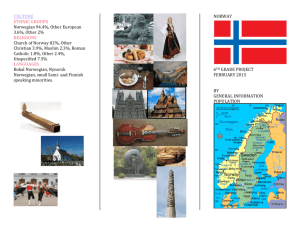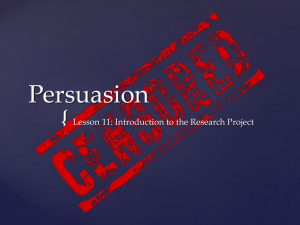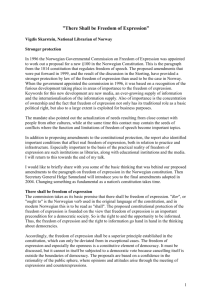The Norwegian Constitution`s Article 100
advertisement

The Norwegian Constitution’s Article 100 Helge Sønneland, Norwegian Ministry of Culture and Church Affairs Ladies and gentlemen, Thank you for inviting me, and thanks to the FAIFE Committee, The Norwegian Library Association and the Beacon of Freedom of Expression for taking the initiative to this painfully timely satellite meeting. On behalf of the Minister of Culture and Church Affairs of Norway, Mrs Valgerd Svarstad Haugland, I take pride in representing the Ministry as a co-arranger, and in addressing you on this occasion. I will speak to you in the language most spoken in the world, namely English as spoken by foreigners. As to the issue on our agenda, I take as my point of departure the situation and the debate in my own country, Norway - and allow myself to elaborate on what the National Librarian Vigdis Moe Skarstein has presented, in her presentation of the proposals from the commission on freedom of speech. Following the report from the Commission of which Mrs Skarstein was vicechairperson, there has been a wide-ranging public debate in Norway on questions concerning the basis, scope and limits to freedom of expression, and how to reformulate our Constitution’s Article 100. In spring 2004, after having chosen amongst thousands of possible formulations, the Government presented a white paper in which the Government’s views and proposals were outlined. Finally, on Sept. 30 2004 – the last day possible, according to constitutional procedures, the Norwegian Parliament adopted a new article 100 that protects freedom of expression and information in a stronger and broader way than previously. Article 100 of the Norwegian Constitution as adopted in autumn 2004: (1) There shall be freedom of expression. (2) No person may be held liable in law on any other grounds than contractual or other obligation under private law for having imparted or received information, ideas or messages unless such liability can be justified held up against the grounds for freedom of expression, which are the truth-seeking, democracy and the individual’s free formation of opinion. Such legal liability shall be prescribed by law. (3) Everyone shall be free to speak his mind frankly on the administration of the state and on any other subject whatsoever. Clearly defined limitations to this right may only be imposed when particularly weighty considerations so justify held up against the grounds for freedom of expression. (4) Prior censorship and other preventive measures may not be applied unless so required in order to protect children and young persons form the harmful influence of moving pictures. Censorship of letters may only be practised in institutions. (5) Everyone has a right of access to documents of the state and municipal administration and a right to follow the proceedings of the courts and elected bodies. Limitations to this right may be prescribed by law to protect the privacy of the individual or for other weighty reasons. (6) The State authorities shall create conditions that facilitate open and enlightened public discourse. The adopted text addresses the basic ideas - and as was said – includes in the text itself three vital processes in society that any impediment to free speech must be measured against. (The translation printed here is not authorized, but serves its function for today’s meeting). Put in simple terms, the idea is that persons who enjoy the right to speak their mind freely will learn to respect the opinions of other people, to correct their own opinions and thus be able to take active part in society in a constructive and enlightened manner. Let’s take a closer look at the sixth paragraph of the new article – because it, to my mind, concerns the core of this meeting: the functions of libraries. (6) The State authorities shall create conditions that facilitate open and enlightened public discourse. This paragraph establishes the state’s obligation to create the conditions necessary for an open and enlightened public debate. The thought is that freedom of speech contributes to truth, democracy and individual freedom only if we have arenas, meeting places and channels for the exchange of information and opinions; in other words, an infrastructure for freedom of expression and information. The libraries are a vital link in this infrastructure, along with the media, schools, theatres and museums. The libraries safeguard the freedom of speech by guaranteeing free and public access to information, by stimulating the search for knowledge and understanding. The distinctive characteristic of public libraries is that everyone enjoys the same right to seek information, irrespective of financial or social status. In this respect, I have noted the IFLA declarations on Libraries and intellectual freedom, and cannot but support the wording of the IFLA statement of March 1999, reiterated and affirmed in the Glasgow declaration, proclaimed by the Council in August 2002.The challenges highlighted in these documents represent challenges to governments and libraries alike. Back to the 6th paragraph. In a legal context the obligations stemming from this paragraph is a novelty. In practice, however, the Norwegian state has for decades taken an interest in the development and maintenance of a public sphere, for instance through financial contribution to education, art, culture, media and libraries. Although more of a political than a legal obligation, the paragraph implies that the state should, inter alia, continue to contribute financially to art, culture, public service broadcasting and literature, and be concerned with media ownership concentration and support of newspapers. (Recall that freedom of expression is not equivalent to freedom of the press - on the contrary. Freedom of the press is the editor’s freedom to edit – including the right to refuse my wish to express myself in the newspaper – which underlines the need for multiple channels of expression) The adoption of the new Article has consequences in many fields. The parliament in paragraph 5 adopted the proposal to include the principle of public access to official documents. This is a novelty and is unique. For one, a proposal for new legislation concerning the public’s right to information held by public authorities is pending before Parliament. In my own Ministry’s field of responsibility, I would like to relate to you the following: The prohibition of prior censorship as formulated in paragraph 4 now includes as proposed any form of speech, regardless of chosen media – as opposed to the earlier formulation which only applied to printed materials. When it comes to printed material, the prohibition against censorship is close to absolute/total. In principle, the proposal will also apply to regulations which constitute a hindrance to the free establishment of channels of communication, for instance licensing requirements in the media sector. Which means that when there are enough available frequencies, licensing will be abolished. As a direct consequence, the censorship of films for an adult audience has already been abolished, whereas censorship of films for minors will be maintained. The necessary legal amendments to our film law will be presented during this fall. There are many other questions concerning intellectual freedom where legislation must be changed which still have not got their final answers – one example is the question of whether or not – or how or to what degree– the present prohibition on political advertising in TV should be upheld. A proposal to prescribe in law the rights and duties of editors in all medias, has been positively received by the present Government. The new §100 opens up for such legislation, which will at the earliest be presented in the spring 2006. My intervention so far concerns what I regard as questions of the framework and prerequisites for the development and maintenance of intellectual freedom. I will end by focusing on the need for collaboration and cooperation in the continuous work to uphold and develop the infrastructure for freedom of expression and information. The existence and work of FAIFE is a prominent example of fruitful cooperation. Another is the work of the Beacon of Freedom of Expression, which you will hear more about later on, from Mette Newth, the dedicated leader of the Steering committee. The Beacon is a database on censored books in a majority of countries through the years – and on literature on freedom of expression. My ministry has supported this project financially since the start, and it was with great pleasure that we dedicated the Beacon to the Bibliotheca Alexandrina. It has been gratifying to see how well the database has been received by the library and its director Mr Serageldin. We see that it represents a basis for further development and cooperation, which we are prepared to support in collaboration with and under the responsibility of the Norwegian National Library thus providing one important platform for the continued work for freedom of expression. Thank you.








